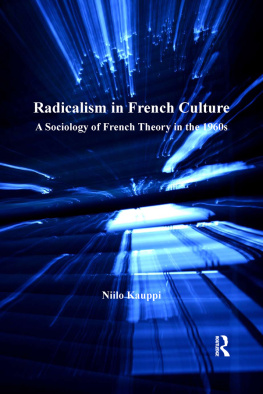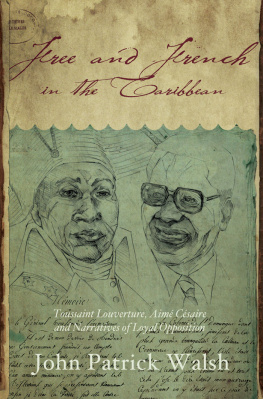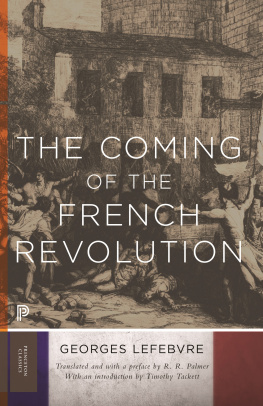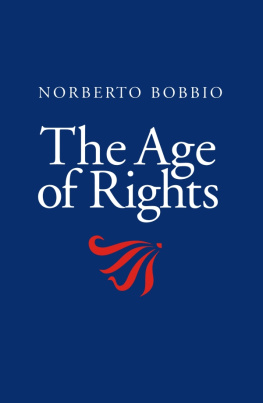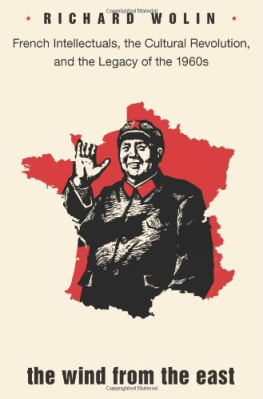Kauppi Niilo - Radicalism in French culture: a sociology of French theory in the 1960s
Here you can read online Kauppi Niilo - Radicalism in French culture: a sociology of French theory in the 1960s full text of the book (entire story) in english for free. Download pdf and epub, get meaning, cover and reviews about this ebook. City: France, year: 2016;2010, publisher: Routledge, genre: Politics. Description of the work, (preface) as well as reviews are available. Best literature library LitArk.com created for fans of good reading and offers a wide selection of genres:
Romance novel
Science fiction
Adventure
Detective
Science
History
Home and family
Prose
Art
Politics
Computer
Non-fiction
Religion
Business
Children
Humor
Choose a favorite category and find really read worthwhile books. Enjoy immersion in the world of imagination, feel the emotions of the characters or learn something new for yourself, make an fascinating discovery.
- Book:Radicalism in French culture: a sociology of French theory in the 1960s
- Author:
- Publisher:Routledge
- Genre:
- Year:2016;2010
- City:France
- Rating:5 / 5
- Favourites:Add to favourites
- Your mark:
- 100
- 1
- 2
- 3
- 4
- 5
Radicalism in French culture: a sociology of French theory in the 1960s: summary, description and annotation
We offer to read an annotation, description, summary or preface (depends on what the author of the book "Radicalism in French culture: a sociology of French theory in the 1960s" wrote himself). If you haven't found the necessary information about the book — write in the comments, we will try to find it.
Kauppi Niilo: author's other books
Who wrote Radicalism in French culture: a sociology of French theory in the 1960s? Find out the surname, the name of the author of the book and a list of all author's works by series.
Radicalism in French culture: a sociology of French theory in the 1960s — read online for free the complete book (whole text) full work
Below is the text of the book, divided by pages. System saving the place of the last page read, allows you to conveniently read the book "Radicalism in French culture: a sociology of French theory in the 1960s" online for free, without having to search again every time where you left off. Put a bookmark, and you can go to the page where you finished reading at any time.
Font size:
Interval:
Bookmark:
RADICALISM IN FRENCH CULTURE
Series Editors
Dr Andreas Hess, University College Dublin, Ireland
Dr Neil McLaughlin, McMaster University, Canada
The sociology of knowledge has a long and distinctive history. Its function has always been that of attempting to bridge the aspirations of the discursive and institutional founding fathers of sociology with that of modern attempts to define the discipline through the study of the emergence, role and social function of ideas. However, since Mannheim first outlined his program in the 1920s, the sociology of knowledge has undergone many changes. The field has become extremely differentiated and some of its best practitioners now sail under different flags and discuss their work under different headings. This new series charts the progress that has been made in recent times despite the different labels. Be it intellectual history Cambridge-style, the new sociology of ideas which is now gaining strength in North America, or the more European cultural analysis which is associated with the name of Bourdieu, this series aims at being inclusive while simultaneously striving for sociological insight and excellence. All too often modern attempts in the sociology of knowledge, broadly conceived, have only looked at form while they downplayed or disregarded content, substance of argument or meaning. This series will help to rectify this.
A Sociology of French Theory in the 1960s
NIILO KAUPPI
CNRS/University of Strasbourg, France

First published 2010 by Ashgate Publishing
Published 2016 by Routledge
2 Park Square, Milton Park, Abingdon, Oxon OX14 4RN
711 Third Avenue, New York, NY 10017, USA
Routledge is an imprint of the Taylor & Francis Group, an informa business
Copyright Niilo Kauppi 2010
Niilo Kauppi has asserted his right under the Copyright, Designs and Patents Act, 1988, to be identified as the author of this work.
All rights reserved. No part of this publication may be reproduced, stored in a retrieval system or transmitted in any form or by any means, electronic, mechanical, photocopying, recording or otherwise without the prior permission of the publisher.
Notice:
Product or corporate names may be trademarks or registered trademarks, and areused only for identification and explanation without intent to infringe.
British Library Cataloguing in Publication Data
Kauppi, Niilo.
Radicalism in French culture : a sociology of French theory
in the 1960s. -- (Public intellectuals and the sociology of
knowledge)
1. France--Intellectual life--20th century.
2. Radicalism--France--History--20th century.
3. Philosophy, French--20th century. 4. Literature and
society--France--History--20th century.
I. Title II. Series
306.42094409046-dc22
Library of Congress Cataloging-in-Publication Data
Kauppi, Niilo.
Radicalism in French culture : a sociology of French theory in the 1960s / by Niilo Kauppi.
p. cm. -- (Public intellectuals and the sociology of knowledge)
Includes index.
ISBN 978-1-4094-0783-6 (hardback) -- ISBN 978-1-4094-0784-3 (ebook)
1. Radicalism--France--History--20th century. 2. France--Politics and government--20th century. 3. France--Intellectual life--20th century. I. Title.
HN440.R3.K3817 2010
303.484094409045--dc22
2010022218
ISBN 9781409407836 (hbk)
This work has been long in the making. It started in 1984 while I was a philosophy major at the University of Helsinki, Finland. Interested in modern philosophy, I had written pieces on Derrida, Foucault, Saussure and Weber, to the irritation of my teachersmost of them students of the late Georg Henrik von Wrightversed in analytical philosophy. Encouraged by my mentor Ilkka Heiskanen, I decided to explore for my masters thesis the politics of knowledge involved in the semiotic theory of Julia Kristeva. For my Ph.D. thesis, I started looking for more social scientific ideas. Ilkka proposed I read Pierre Bourdieu, whose work had started to come out in Finnish. Intrigued by the social scientific perspective developed by Bourdieu, especially in his study on the political ontology of Martin Heidegger, I decided to send him a Ph.D. proposal. Through my readings my previous philosophical interests had turned into more empirical ones, and I composed a Ph.D. project on the avant-garde journal Tel Quel (of which Kristeva had been a member) in the 1960s in France. The journal was then, in the mid-1980s, little known outside of France. Only a few doctoral dissertations existed, produced by German linguists and literary theorists. To the surprise of everyone, including myself, Bourdieu liked my proposal, and invited me to join his doctoral seminar at the Ecole des hautes tudes en sciences sociales in Paris starting from the Fall of 1986. The Academy of Finlanda publicly funded research instituteprovided me with a generous grant.
The fieldwork I did in Paris in French intellectual milieus and Bourdieus as well as his associates Monique de Saint Martins teaching and advice enabled me to develop a sociological perspective on Tel Quel and the French intelligentsia of the 1960s. As a preliminary, however, I wrote in Finnish a nearly 800-page Licenciate thesis (a small thesis preceding the Ph.D. thesis) on the history of Tel Quel that I defended in 1987.
For the Ph.D. dissertation, I composed in French a more compact, sociological analysis that scrutinized the links between Tel Quel, the social conditions of its existence and the institutional context of the French intellectual field. Defended at the University of Helsinki in 1991, the Ph.D. thesis (La constitution sociale dune avant-garde) had left outbecause of size requirementsthe analysis of the texts and ideas produced that was included in the small thesis. The work at hand is a rewriting of these parts that were not included in the Ph.D. thesis and its English language expanded version (The Making of an Avant-Garde: Tel Quel 1994).
Since those times my point of view has evolved into a more Weberian one. This development is visible in my books that have come out since 1991/1994 (French Intellectual Nobility in 1996, The Politics of Embodiment in 2000 and Democracy, Social Resources and Political Power in the European Union in 2005). Since the 1990s I have moved from the sociology of culture and intellectuals to political sociology. The subsequent changes in the sociology of ideas, notably the development since the 2000s of the so-called new sociology of ideas, revived the idea of publishing, in a worked out form, my earlier textual analysis of what has become French theory. From this post-post-Kantian perspective, the social cannot be separated from the symbolic and the normative, nor the personal from the collective. The dramatis personae of this study can already be found in my earlier works. I have provided each chapter with an epigraph that illustrates the ironic, playful and irreverent spirit of the 1960s.
The exhaustive list of individuals to thank would be too long. I owe an immense sense of gratitude to my teachers the late Pierre Bourdieu and Ilkka Heiskanen, for their interest and encouragement. I would also like to thank the late Jacques Derrida, who recommended I proceed to an internal analysis of texts, a suggestion I took up in my Licentiate thesis. I am grateful to the former Telquelians I succeeded in meeting, Jean-Louis Baudry, Jean-Joseph Goux, Jacques Henric, Julia Kristeva, Paule Thvenin and Jean Thibaudeau for the information they provided me concerning intellectual life in the 1960s. I want to express my thanks to those friends and colleagues who have commented critically on this work at various stages, Pami Aalto, Kimmo Absetz, Laurent Jeanpierre, Nely Keinanen and Henri Vogt. And above all I am grateful to my family, my parents Ellen and Risto, who have always been supportive of my intellectual quest, and to Anne Epstein as well as to our children Oona and Caius. Without their unfailing support, I would never have gotten where I am now.
Next pageFont size:
Interval:
Bookmark:
Similar books «Radicalism in French culture: a sociology of French theory in the 1960s»
Look at similar books to Radicalism in French culture: a sociology of French theory in the 1960s. We have selected literature similar in name and meaning in the hope of providing readers with more options to find new, interesting, not yet read works.
Discussion, reviews of the book Radicalism in French culture: a sociology of French theory in the 1960s and just readers' own opinions. Leave your comments, write what you think about the work, its meaning or the main characters. Specify what exactly you liked and what you didn't like, and why you think so.

